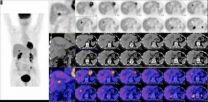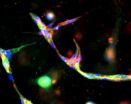(Press-News.org) While the blood-brain barrier (BBB) protects the brain from harmful chemicals occurring naturally in the blood, it also obstructs the transport of drugs to the brain. In an article in Nature scientists at the Swedish medical university Karolinska Institutet now present a potential solution to the problem. The key to the BBB is a cell-type in the blood vessel walls called pericytes, and the researchers hope that their findings will one day contribute to new therapies for diseases like Alzheimer's and stroke.
"Our new results show that the blood-brain barrier is regulated by pericytes, and can be opened in a way that allows the passage of molecules of different sizes while keeping the brain's basic functions operating properly," says Christer Betsholtz, professor of vascular biology at the Department of Medical Biochemistry, who has led the study.
The blood-brain barrier is a term denoting the separation of blood from tissue by blood vessels that are extremely tight? Impermeable?. In other organs, the capillary walls let certain substances carried by the blood, such as the plasma proteins albumin and immunoglobulin, out into the surrounding tissue. In the brain, however, this pathway is closed off. This is essential for many reasons, one being that the plasma proteins are harmful to nerve cells.
In recent time, capillary permeability in the brain has been discussed as a factor of potential significance to neurodegenerative diseases, such as Alzheimer's, Parkinson's and ALS.
"Our new knowledge of how the BBB is regulated could be used in two ways," says Professor Betsholtz. "To protect the brain under conditions such as stroke and inflammation that lead to the opening of the BBB and the release of neurodamaging substances; and to open the barrier temporarily to allow the transport of drugs against neurodegenerative and other diseases of the brain."
In the study, which is now published in Nature, Professor Betsholtz and his research group show how this would be possible. The pericytes normally maintain the barrier function through an as-yet unknown molecular mechanism; in their absence, a special transport process called transcytosis opens a path through the capillary walls so that molecules of different sizes, including large plasma proteins, can pass from the blood into the brain. The pericytes also regulate another type of brain cell known as an astrocyte. Astrocytes contribute to the BBB through special extensions called end-feet which envelop the capillaries and regulate water and ion flows.
"Another interesting find is that the cancer drug Imatinib, which inhibits certain signal proteins for cell growth, has a similar effect in the presence of pericytes in that they also close the capillary wall transport paths," says Professor Christer Betsholtz.
###
Also involved in the study were researchers at the Sahlgrenska Academy in Gothenburg. The study was financed through grants from the Swedish Agency for Innovation Systems, the EU Sixth Framework Programme, the Swedish Cancer Society, the Knut and Alice Wallenberg Foundation, the Inga-Britt and Arne Lundberg Research Foundation and the Söderberg foundations.
Publication: "Pericytes regulate the blood-brain barrier", Annika Armulik, Guillem Genové, Maarja Mäe, Maya H. Nisancioglu, Elisabet Wallgard, Colin Niaudet, Liqun He, Jenny Norlin, Per Lindblom, Karin Strittmatter, Bengt R. Johansson & Christer Betsholtz, Nature, AOP 13 October 2010. DOI: 10.1038/nature09522.
Download press images: http://ki.se/pressroom
For further information, please contact:
Professor Christer Betsholtz
Department of Medical Biochemistry and Biophysics
Tel: +46(0)8-524-87960 or +46(0)709-79 66 90
Email: Christer.Betsholtz@ki.se
Press Officer Katarina Sternudd
Tel: +46 (0)8-524 838 95
Email: katarina.sternudd@ki.se
Karolinska Institutet is one of the world's leading medical universities. Its mission is to contribute to the improvement of human health through research and education. Karolinska Institutet accounts for over 40 per cent of the medical academic research conducted in Sweden, and offers the country's broadest range of education in medicine and health sciences. Since 1901 the Nobel Assembly at Karolinska Institutet has selected the Nobel laureates in Physiology or Medicine. More information on ki.se
END
Many overseas nurses have negative experiences of living and working in the UK, particularly when it comes to feeling personally valued and professionally respected, according to the October issue of the Journal of Clinical Nursing.
Researchers from the University of Northampton also found that discrimination and racism still exist in the National Health Service and that the reality of first-world UK nursing is often very different to what overseas nurses expect.
Senior lecturer and nurse Julia Nichols and Professor of Neurophysiology Jackie Campbell carried out ...
Scientists at the University of Leeds have perfected a new technique that allows them to make molecular nanowires out of thin strips of ring-shaped molecules known as discotic liquid crystals (DLCs).
The findings could be an important step in the development of next generation electronic devices, such as light-harvesting cells and low-cost biosensors that could be used to test water quality in developing countries.
DLCs are disk-shaped molecules that are one of the more promising candidates for organic electronic devices. However, controlling their alignment has proved ...
Disorganised and emotionally unstable, poorly adapted, suffering from alcohol problems, impulsive, or with a "globally adapted" personality. These are the features of the four diagnosed types of compulsive gamblers identified by researchers at the University Hospital of Bellvitge (IDIBELL) and the Autonomous University of Barcelona (UAB). According to the scientific team, only one of these four shows signs of a significant pathology.
"We need to use different treatments for each sub-group of pathological gamblers in order to respond to their specific therapeutic difficulties ...
BEER-SHEVA, ISRAEL, October 14, 2010 -- A new study by Ben-Gurion University of the Negev (BGU) researchers predicts that a new generation of malware (software written for malicious purposes like identity theft) could steal data on human behavior patterns, which is more dangerous than traditional, detectable attacks.
In the newly published paper, "Stealing Reality," Dr. Yaniv Altschuler and Dr. Yuval Elovici from BGU discuss malware threats that extract personal information about relationships in a real-world social network, as well as characteristic information about ...
Researchers a the University of Granada and the Department of Nuclear Medicine, Hospital Virgen de las Nieves at Granada found that the metabolic imaging diagnosis technique –based on the analysis of a structural analog of glucose labeled with a positron-emitting compound (18F)– allows early diagnosis of gall bladder cancer, a relatively rare disease with high mortality rates among most patients suffering from it.
For the purpose of this study, 62 patients were subjected to this scanning method, which represents the largest sample of patients with gall bladder cancer ...
In the first half of February 2009, two asteroids collided in a region of space beyond the orbit of Mars, as scientists from the Max Planck Institute for Solar System Research (MPS) in Germany have now discovered. The researchers were able to pinpoint the exact date of the impact more precisely than ever before. The debris of the crash had attracted the attention of scientists worldwide. Together with the largest earthbound telescopes and the Hubble Space Telescope, the OSIRIS camera system onboard ESA's space probe Rosetta, that was developed and is now operated under ...
VIDEO:
New research from the Bradley Hasbro Children's Research Center may help clinicians better predict how a child with obsessive compulsive disorder (OCD) will respond to some of the most commonly...
Click here for more information.
EAST PROVIDENCE, RI – New research from the Bradley Hasbro Children's Research Center may help clinicians better predict how a child with obsessive compulsive disorder (OCD) will respond to some of the most commonly used treatment approaches. ...
Scientists at the University of East Anglia have made an important breakthrough in the way anti-cancer drugs are tested.
A tumour cannot grow to a large size or spread until it has developed its own blood supply and leading research has looked for a way of halting capillary formation to stop tumours taking hold.
But new findings published today in the Journal of Cell Science have shown that scientists testing such treatments may not have been studying exactly what they thought they were.
The research proves that cells are able to switch their genetic profile – ...
Findings from a study, which appear in the Oct. 14, 2010 New England Journal of Medicine, helped influence the World Health Organization (WHO) to change its guidelines this year for the treatment of HIV-infected women who receive a single dose of the antiretroviral drug nevirapine to prevent HIV transmission to their babies. The study demonstrated that the single dose of nevirapine used to prevent mother-to-child transmission of HIV can hamper the drug's effectiveness if it is also used later as part of a regimen to treat these same individuals.
The Phase III study, called ...
CHAPEL HILL, NC – A collaboration between physicians and scientists at UNC Lineberger Comprehensive Cancer Center and the University of Texas M.D. Anderson Cancer Center has demonstrated that a biomarker called TCF21 may be used to develop a potential screening test for early-stage lung cancer.
Despite the fact that lung cancer is the leading cause of cancer deaths worldwide, early-stage lung cancer is difficult to diagnose. A number of proposed screening tests, including screening CT scans and serum markers, have not shown any benefit in enhancing patient survival.
TCF21 ...




